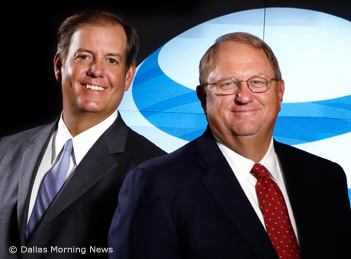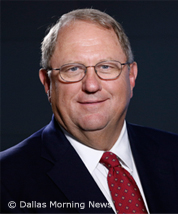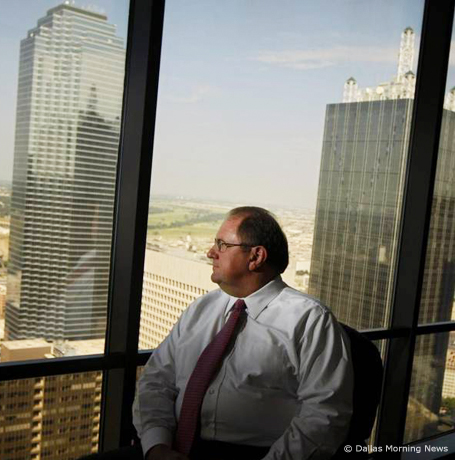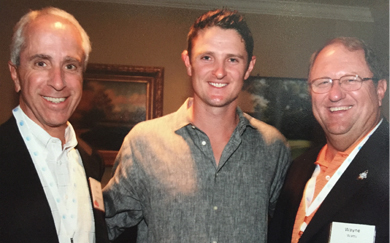
© 2015 The Texas Lawbook.
By Mark Curriden
(Sept. 28) – Wayne Watts, an unknown criminal defense lawyer, was eating lunch at Peggy’s Beef Bar – now Peggy Sue BBQ – in the fall 1983, when he spotted an advertisement by Southwestern Bell seeking a full-time in-house trial lawyer.
Days later, he was hired for $45,000 a year as one of 60 lawyers in the telephone company’s legal department.
Three decades later, Watts is one of the most influential and well-paid business lawyers in the world. He built the company’s legal department into one of the largest and most prestigious in the U.S. His compensation last year, according to Corporate Counsel magazine, topped $10 million.
Next week, the General Counsel Forum, a group of 700 chief legal officers at the largest businesses in Texas, honors Watts with its prestigious Robert Dedman Award for Ethics and Law.
“The moral of the story is to eat more fried pies and onion rings,” he says.
On Wednesday, Watts, who is 62, retires from AT&T as its executive vice president and general counsel and passes the mantel to his handpicked successor, David McAtee, an antitrust lawyer at Dallas-based Haynes and Boone, hired three years ago by Watts to be his chief deputy.

“It’s the end of an era,” says Mike Boone, a corporate M&A partner and co-founder of Haynes and Boone in Dallas. “Wayne will go down in history as one of the great corporate general counsel. His successor is going to be great, too.”
Watts says he spent a significant amount of time during the past year preparing for his departure.
“The idea was to bring David in and see if he’s the right person for the job,” Watts told The Texas Lawbook in an exclusive interview. “He is the right person. This department is in really good shape for a long time.”
The transfer of power comes at a time when AT&T faces increased regulatory scrutiny by multiple federal agencies, while at the same time trying to integrate its recent $49 billion purchase of DirecTV.

Exxon Mobil General Counsel Jack Balagia says McAtee will be successful.
“David has had a great mentor in Wayne, and that gives him a good head start,” Balagia says. “And his experience at Haynes and Boone, where he practiced with some exceptional lawyers before he joined AT&T, will serve him well.
“It may be a challenge initially for David to follow in the footsteps of someone who is an icon at AT&T and in the corporate legal community,” says Balagia, who followed legendary Exxon GC Charles Matthews. “But ultimately, David will make his own mark on AT&T and its law department, and I expect both will be better for having David there. David will be very successful.”
McAtee, a former partner at Haynes and Boone who handled antitrust litigation matters for AT&T, says Watts called him in August 2011 to have lunch at the Crescent Club.
“David, I didn’t ask you to lunch for your sparkling personality,” McAtee recalls Watts saying.
“Wayne created a position for me that didn’t previously exist,” McAtee says. “After all the mergers, he was trying to integrate his litigation team but they were split up under all the different companies.
“Wayne said the problem was, there wasn’t ‘one throat to choke,’” he says, quoting Watts. “There was no one person to hold responsible. You know, I’m not sure he ever actually offered me the job. He just made it known that it was me.”
McAtee and others say Watts revolutionized the position of corporate general counsel from being just a lawyer that executives called when there was a crisis to being a critical player intricately involved in every aspect of the company’s operations.
Balagia says he adopted Watts’ view that “the job of the law department is to protect and enable the businesses.”
Watts understood that it was the legal department’s responsibility to help the business’s executives “achieve their objectives in full compliance with the law, and protect the business and the shareholders from possible legal pitfalls and significant litigation,” Balagia says.
During the past 32 years, Watts guided the phone company through dozens of mega-mergers and acquisitions with a combined value of nearly $300 billion. Those transactions transformed the smallest of the seven Baby Bells into the modern day global communications giant AT&T.
As AT&T expanded, Watts grew the legal department to the 600 attorneys it has today, making it one of the largest in-house corporate legal departments in the world. In addition, he and his lieutenants hire hundreds of outside lawyers around the world annually to represent the company in legal matters ranging from allegations of antitrust violations and patent infringements to regulatory challenges and contract disputes.

“We now have 270,000 employees,” he says. “Somebody is going to make a mistake. Somebody is going to be a dumbass. In a company of our size and reach, we are going to have a lot of legal issues.”
Watts used his position as a bully pulpit to push a progressive social agenda. He aggressively pressured Texas law firms to add more women and ethnic minorities to their lawyer ranks. He encouraged those law firms to commit more time to legal services to the poor.
“[Wayne’s] leadership on the Texas Access to Justice Commission has been pretty stellar,” says Balagia, referring to the volunteer agency that funds pro bono services throughout the state. “He has helped raise significant dollars for the provision of legal services to the poor and to veterans in Texas. That is a subject that both of our law departments feel quite strongly about.”
When the General Counsel Forum announced that it was honoring him with its Robert Dedman Ethics and Law Award at a dinner on Oct. 6, Watts said that he would accept only if all the proceeds after expenses from the event would go to scholarships at SMU Dedman School of Law, which is his alma mater. They assured him that it does.
“Ethics are not just about a set of rules,” he says. “Ethics is about doing what’s right, even if it means sacrifice.”
A few years ago, Watts received an envelop in the mail that was sent from someone internally at a competitor. The note said there was a confidential list of our competitor’s customers.
“We immediately decided we would not open it,” he says. “We sent it to my GC counterpart and told him that we did not look at it at all and we hadn’t. Ethics must be a part of your fabric.”
Despite the rise to power, Watts never lost touch with his roots. He frequently took guests to the window of his corner office on the 37th floor of One AT&T Plaza on South Akard Street in downtown Dallas.
“I grew up right there in Oak Cliff – 920 South Oak Cliff Blvd.,” he says. “If you look at that house, nobody would have predicted my career. It is just inconceivable.”
Watts says he wanted to be a lawyer since he was 10 years old and watched Perry Mason on television.
“Lawyers were fighting for people and saving lives,” he says.
Watts says one of his favorite early memories is watching the scene in the movie “To Kill a Mockingbird” when Atticus Finch is packing his briefcase at the end of the trial and all the African-Americans sitting in the courthouse balcony rise to their feet.
The Rev. Sykes tells Scout, “Miss Jean Louise.. Jean Louise… Stand up. Your father is passing.”
“I still tear up every time I see that scene,” he says. “That’s why I became a lawyer.”
Watts went to college at the University of Texas at Arlington and then law school at SMU Dedman. His first actual case came during his third year at SMU when a fellow student was arrested for resisting arrest at a party.
“I filed a motion to dismiss and was totally shocked when the judge granted it – mainly because we had no idea what we were doing,” Watts told The Texas Lawbook in an interview in 2013.
Despite his interests in criminal law and litigation, Watts will go down in history as one of the all-time great lawyers in corporate mergers and acquisitions.
Southwestern Bell moved Watts to the company’s M&A team in 1988 and Watts got right to work.
After a series of smaller acquisitions, Watts led SBC’s purchase of Pac-Tel for $16 billion and Southern New England Telephone Co. in 1998 for $4.4 billion. Later that same year, he engineered SBC’s $62 billion merger with Ameritech. In 1999, he led SBC’s $1.7 billion acquisition of Comcast Cellular.
In 2005, SBC purchased AT&T for $16 billion and officially adopted its target’s corporate name. A year later, AT&T acquired BellSouth and Cingular Wireless – now AT&T Mobility – for $86 billion. In the AT&T Wireless deal, Watts was in New York when he learned late on a cold night in February that a British rival was on the verge of stealing the transaction away. Watts and his predecessor convinced their corporate board to approve a sweeter offer to BellSouth – a deal Watts signed shortly before 3 a.m.
“Wayne has been front and center in shepherding this company from a wired business to a wireless business to now a video business,” says AT&T senior executive vice president Bill Blase, who has worked with Watts for 25 years. “These mergers would not have happened without Wayne’s calming influence and leadership.

“Wayne is tough as nails. He stands down very strong personalities – inside and outside the company,” Blase says. “It’s the textbook way to leave a business. Wayne is leaving at the top of the game.”
In July, Watts closed on AT&T’s purchase of DirecTV for $49 billion.
“At the end of the day, if you are negotiating an acquisition, it is going to be combative,” he says. “I fill the qualification as being the most difficult and stubborn person in the negotiating room.”
Asked to identify his biggest disappointment or failure during his tenure at AT&T, Watts smiles.
“You’re going to make me say it, aren’t you?” he responds. “Fine. T-Mobile.”
In 2011, AT&T agreed to buy T-Mobile for $39 billion. The deal appeared to be cruising toward a closing when the U.S. Justice Department intervened, filing a lawsuit to stop the acquisition on antitrust grounds.
“That was a very dark day,” Watts says. “I had a task and I didn’t get it finished. The reality is that the goal post was moved on us. I really would have liked to take that case to trial and had my chance in the batter’s box. I think we could have won at trial.”
“The DirecTV deal made T-Mobile a lot less painful, but I will never get over it,” he says.
Jared Watts said he was with his father the day the T-Mobile deal fell apart.
“My dad was so dejected,” he says. “I’ve never seen him so exhausted and sad. You could tell he took it personally.”
The younger Watts says most people don’t know or see the human side of his father.
“He is very humble,” he says. “My dad’s faith is very important. My mom is a minister and my dad teaches Sunday School.
Jared Watts says his dad actually packed up his office last week and moved everything to he and his wife’s San Antonio retirement home.
“I look forward to getting up every morning and asking, ‘what am I going to do today,” Watts says. “I’m going to garden. I’m going to fish. I’m going to play with my grandchildren. And I’m going to play golf.”
Lots of golf, he emphasizes.
“[Wayne] is certainly competitive with my game,” says Balagia, who is Watts’ frequent golf partner. “He hits the ball a million miles, although getting it where he wants it to go can sometimes be problematic. We are both capable of shooting in the low 80’s, rarely better than that and often worse.”
© 2015 The Texas Lawbook. Content of The Texas Lawbook is controlled and protected by specific licensing agreements with our subscribers and under federal copyright laws. Any distribution of this content without the consent of The Texas Lawbook is prohibited.
If you see any inaccuracy in any article in The Texas Lawbook, please contact us. Our goal is content that is 100% true and accurate. Thank you.
